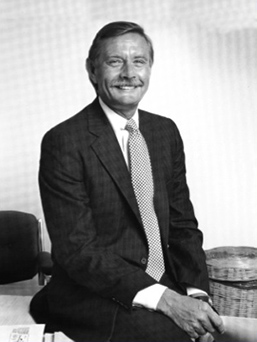
When the origins of Rx advertising on the West Coast are discussed, the name at the top of the list is always Bob Buechert. More than any other individual, he established the medical advertising community in San Francisco. His accomplishments, principally as the key player in the creation of Vicom, were impressive, and in style, talent, and temperament, he was every inch a leader.
Buechert was from Hillside, NJ, outside of Newark. He attended Cooper Union and, after a stint in the Army, joined the Klemtner agency (at the time located in Newark) as an art director. He had the good fortune to work on the Pfizer account when that company was breaking new ground in pharmaceutical advertising and marketing. Bob was the designer on campaigns for such major products as Vibramycin, Vistaril, and Diabenese, and he rose to a management position in the creative hierarchy. One of Klemtner’s clients was Syntex, with offices in Palo Alto, CA, and servicing the account required transcontinental travel by Bob and others from New York.
This arrangement was not tenable as the account grew. So Klemtner expanded its San Francisco office, with Buechert heading up the creative department. Then, the account moved to J.W. Thompson’s Rx group, Deltakos, headed by James Barnum. Buechert moved with Syntex to that agency. When Barnum, after a dispute with JWT, set up his own agency, taking Syntex and other West Coast clients with him, Buechert joined the new Barnum agency. Soon, JWT and Barnum were mired in a suit and counter-suit. The eventual settlement allowed Buechert and senior executives to buy out Barnum, setting up a new agency—Vicom. In all this tumult, Buechert emerged as the dominant management figure in San Francisco Rx advertising—the person on whom all could agree and whom Syntex, the key account, trusted.
Buechert was well prepared for the leadership role he had assumed. He has been described as “the consummate ad man” for his full command of all aspects of agency operations and for his “instincts for the business.” This understanding probably was deepened by his experiences at agency satellite offices, where everyone was close to the workings of the organization. It may also have come from his early years as a creative manager at Klemtner. When Harry Sweeney, who worked with Bob as a copywriter at that time, joined the agency, it was, in his words “in a bit of a turmoil.”
The agency’s five partners were not on good terms, and, says Sweeney, “Bob was the fulcrum because he had the confidence of all the partners. He was kind of acting as the ‘cruise director,’ to try to keep everything calm.”
Buechert’s ability to establish calm—to be cool under pressure—is mentioned repeatedly in recollections of him. To play that “fulcrum” role at Klemtner, required knowledge of operational detail. The experience undoubtedly equipped him to be the consensus leader at Vicom in San Francisco.
The ultimate test of the ability to make a group work together is to do so, even with strong personalities who are often more interested in individual expression. Buechert played team manager for years in the hyper-creative world of San Francisco with an extremely talented and eccentric cast including such notables as the innovative Lester Barnett and the iconoclastic Reg Bowes.
Bowes often tested Buechert’s legendary powers as a negotiator with his behavior at clients. Bowes is the first to admit that he made problems for Buechert.
“Poor Bob was victimized by me,” Bowes recalls. “I was apt to say exactly what I thought, which is not always the best thing to do to get along. Bob would have to pick up all the pieces and cement them all back together…I was ready to resign the world if the world proved stupid.”
Buechert was called on again and again to smooth over Bowes’ bluntness, but he could turn his skill as a negotiator to advantage with Bowes as well. Bowes was conscious how well Buechert was handling him and coined the word “buecked” to describe Bob’s ability to get what he wanted from you while making you think you were getting what you wanted.
Says Bowes, “I defined ‘buecked’ as to be brought to two equally unsatisfactory alternatives, one of which you absolutely insist on.”
Buechert would apparently lead negotiations—with clients, employees, suppliers, and at all levels of business—to the negative consequences of a course contrary to his own and bring the persons he was negotiating with to accept something which had been “unsatisfactory” to them at the beginning. Buechert liked Bowes’ description on his negotiating method so much that he had “buecked” t-shirts made up and gave them to Vicom executives.
Buechert’s success came from more than agency knowledge and negotiating skill. He understood the client-agency dynamic. Lester Barnett, a long-time associate, sums up this important Buechert ability: “He made you think not only about building your career, but building an agency. He made you think about building clients’ careers…that if they grew, we grew. I think his leadership quality was a long-term view and I’d use the word ‘wisdom.'”
Bowes adds this about another quality: “Bob was a man who rescued you, one way or another. He was always there when you needed him.”
Buechert engineered the sale of Vicom to FCB in 1984. He stayed on until retirement in 1991. He passed away in November of 2001.